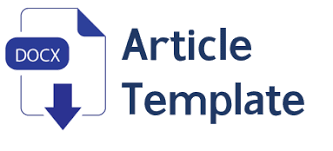Development of Collective Teaching Aids (Educational Learning Boxes) based on Education for Sustainable Development Climate Change Material for Class VII Middle School
Abstract
Climate change has now become one of the problems that has a major influence on sustainable development. Efforts to preserve the environment are a responsibility and challenge for the young generation now and in the future. Education about understanding environmental problems for society is very important so that they are aware and can make good decisions for the environment and society. This research aims to produce teaching aids based on Education For Sustainability (ESD). The development of teaching aids as a learning resource uses the R&D (Research and Development) research method which is used to produce certain products and test the product's effectiveness. The development model used is ADDIE which includes analysis, design, development or production, implementation or delivery and evaluation. The instrument used in this research is an expert validation sheet for ESD teaching aids. Data analysis techniques consist of display analysis, quality analysis and ESD approach analysis. The percentage of feasibility test results for ESD-based climate change teaching aids by media experts and material experts obtained an average of 90% and 91% with very good criteria, so it can be concluded that the ESD-based teaching aids developed are suitable for use as a learning medium for participants educate.
References
Alhaddad, I. (2012). Penerapan teori perkembangan mental Piaget pada konsep kekekalan panjang. Infinity Journal, 1(1), 31-44.
Dick, W., Carey, J. O. (2005). The Systematic Design of Instruction.
Hakky, M. K., Wirasasmita, R. H., & Uska, M. Z. (2018). Pengembangan media pembelajaran berbasis android untuk siswa kelas X pada mata pelajaran sistem operasi. Edumatic: Jurnal Pendidikan Informatika, 2(1), 24-33. https://e-journal.hamzanwadi.ac.id/index.php/edumatic/article/view/868/pdf_5
Junaidi, N. S., Asra, A., Fathoni, A., & Sari, I. (2022). Rancang Bangun Alat Peraga Mobil Remot Kontrol Berbasis Education For Sustainable Development (ESD). Aptek, 20-24.
Juwairiah, (2013), Alat Peraga Dan Media Pembelajaran Kimia, Alat peraga dan media, 4 (1), 1-13
Martin; Hartini T. I; Ermawati I. R; (2022). Alat Peraga Instalasi Listrik 1 Phase dalam Perkuliahan Fisika Dasar 2. JIPFRI (Jurnal Inovasi Pendidikan Fisika dan Riset Ilmiah). 6(2). 107-112.
Novita, D. (2018). Kebijakan Adaptasi Perubahan Iklim Bidang Pertanian. Jurnal Administrasi dan Kebijakan Publik, 8(1), 1-25.
Pratama, R. (2019). Efek Rumah Kaca Terhadap Bumi. Buletin Utama Teknik. 14(2), 120-126. https://jurnal.uisu.ac.id/index.php/but/article/view/1096
Purnamasari, S., & Hanifah, A. N. (2021). Education for Sustainable Development (ESD) dalam pembelajaran IPA. Jurnal Kajian Pendidikan IPA, 1(2), 69-75.
Purwaningtyas, R., Prastiti, T. D., Novianti, I., Wahyuningrum, E., Dafik, D., & Ridlo, Z. R. (2023). Aktivitas Pembelajaran Rbl Dengan Pendekatan Steam: Pemanfaatan Waste Bottle Untuk Pengembangan Sistem Sirkulasi Darah Pada Manusia Berbantuan Augmented Reality (Ar) Dan Kaitannya Dengan Perubahan Suhu Tubuh Dalam Meningkatkan Literasi Perubahan Iklim Sis. Ebook CGANT Universitas Jember.
Sagala, Z. U., Simamora, Y., & Maharani, I. (2019). Pengaruh model pembelajaran contextual teaching and learning terhadap kemampuan pemecahan masalah matematik. FARABI: Jurnal Matematika dan Pendidikan Matematika, 2(2), 11-19.
Teddy, K. (2023). Implementasi Pjbl-Stem Berbasis Esd (Education For Sustainable Development) Pada Topik Energi Terbarukan Untuk Meningkatkan Kemampuan Berpikir Sistem.
Vioreza, N., Hilyati, W., & Lasminingsih, M. (2023). Education for Sustainable Development: Bagaimana Urgensi dan Peluang Penerapannya pada Kurikulum Merdeka?. PUSAKA: Journal of Educational Review, 1(1), 34-48.
Yunus, M., Astuti, I. F., & Khairina, D. M. (2015). Game edukasi matematika untuk sekolah dasar. Jurnal Informatika Mulawarman, 10(2), 59-64. https://e-journals.unmul.ac.id/index.php/JIM/article/view/192/pdf



